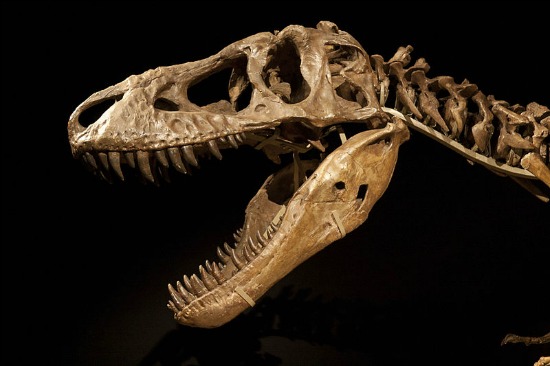Release the Tarbosaurus!
A new twist in the million dollar Tarbosaurus controversy may send this dinosaur home
The auctioned Tarbosaurus skeleton. Image via Heritage Auctions.
A million dollar dinosaur may soon be going home.
Last month, Heritage Auctions offered a mostly complete, reconstructed skeleton of the tyrannosaur Tarbosaurus for sale. This was despite protests from the Mongolian government and paleontologists that the specimen was illegally collected from Mongolia’s Gobi Desert. The country has very strict regulations involving the collection and curation of dinosaurs, and the very fact that the tyrannosaur was taken from Mongolia and put up for sale was a sure sign that it was an illicit specimen. The auction house went along with the sale anyway—where the top bid was a little over one million dollars—but a last-minute restraining order gave Mongolian officials and paleontologists a little more time to investigate the dinosaur.
There could be no doubt about where the dinosaur came from. This Tarbosaurus was collected from Mongolia just a few years ago, in violation of Mongolia’s laws. Frustratingly, however, Heritage Auctions maintained that the specimen had been legally imported to the United States. If this were the case, the skeleton could still be legally sold—even if a specimen is illegally collected from its country of origin, lax importation regulations give dinosaur smugglers legal loopholes.
But the history of this Tarbosaurus may provide the key to sending the dinosaur back to the people of Mongolia. Yesterday, the United States Attorney for the Southern District of New York issued a press release which revealed that the dinosaur was not only collected illegally, but also illegally smuggled into the country.
The paperwork for the Tarbosaurus, which was imported to the United States from England on March 27, 2010, contained several untruths. Despite being excavated in Mongolia, the fossils in the shipment were said to have come from Great Britain. Not that the documents actually said the shipment contained a tyrannosaur. According to the press release, the customs forms only listed “two large rough fossil reptile heads, six boxes of broken fossil bones, three rough fossil reptiles, one fossil lizard, three rough fossil reptiles, and one fossil reptile skull.” It’s not as if the people who possessed the skeleton didn’t realize what they had. According to a report by the Daily Mail, the Tarbosaurus was knowingly shipped to the United States so that the skeleton could be completely assembled.
Official documents named Eric Prokopi as the consignee of the imported fossils. Prokopi, a self-styled commercial paleontologist, runs Florida Fossils and owned the tyrannosaur at the time it was brought into the country. After the dinosaur was prepared in Florida, it was shipped to Texas and then New York for auction.
If you wish to see all the legal files yourself, paleontologist Chris Noto is hosting them on his website. This may be the action that sends the Tarbosaurus home. And Heritage Auctions is stepping aside from the skeleton, shrugging off the blame for auctioning an illegal specimen by saying the company believes the consignor acted in “good faith.” That is demonstrably not the case. The dinosaur was looted, smuggled and would probably be on its way to a private collector’s home—locked away from everyone else—had the Mongolian government and paleontologists not complained about the sale.
I hope the Tarbosaurus will soon be on its way back to Mongolia. But as paleontologist Phil Currie notes in a New Scientist opinion piece, this won’t be the last illegal or illicit dinosaur that comes up for sale. There will undoubtedly be others, but with luck, this case will turn the tide against the wave of poaching that continues to pillage the natural heritage of Mongolia. And that country’s loss is everyone’s loss—stolen dinosaurs are often hastily excavated and disappear into the black market, robbing paleontologists of significant specimens. This makes it that much harder to understand how these animals actually lived, or to bring dinosaurs back to life for the public. Too many dinosaurs have been lost to private owners looking for just another symbol of their affluence. Dinosaurs belong to everyone.
/https://tf-cmsv2-smithsonianmag-media.s3.amazonaws.com/accounts/headshot/RileyBlack.png)

/https://tf-cmsv2-smithsonianmag-media.s3.amazonaws.com/accounts/headshot/RileyBlack.png)